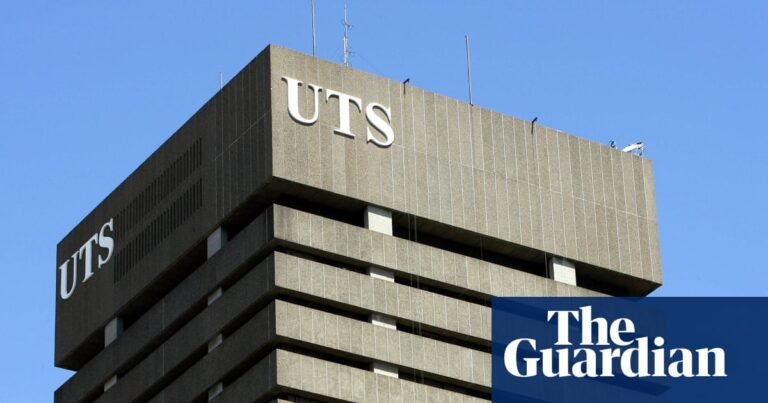The University of Technology Sydney will close its teacher education program and public health school as part of a sweeping restructure that would remove more than 1,100 subjects to return the institution to surplus.
The proposed cuts, released on Wednesday, are part of the debt-ridden university’s strategy to reduce expenditure by $100m annually, including previously announcing the cutting of about 400 jobs.
Under the proposal, the school of professional practice and leadership would be closed as part of a plan to reduce the total number of schools from 24 to 15, and the faculty of law, business school and transdisciplinary school would be combined.
Sign up: AU Breaking News email
The school of public health would be disestablished and become the discipline of public health within the school of sport, exercise and rehabilitation, to be renamed the “school of health and human performance”, and the international studies and education school would be rested.
The proposal’s release was delayed for a week after SafeWork NSW imposed a rare order that the institution must pause job cuts over the risk of “serious and imminent risk of psychological harm” to staff.
Academics at UTS had described feelings of stress and a “culture of fear” after the university temporarily paused student enrolments for 120 of its 615 courses until the end of the autumn 2026 semester.
The updated proposal, seen by Guardian Australia, said UTS would discontinue 167 courses and 1,101 subjects – or 31% – after sustaining five years of deficits, escalating costs and changes to government policy.
It said reducing expenditure by $100m annually was essential to repay a $300m bond taken by UTS and fund “essential capital and strategic requirements over the next five years”.
Some $30m annually was expected to be saved by making 134 full-time staff redundant, including 55 in design and society, 30 in business and 22 in health – excluding voluntary separations.
The proposal said courses identified to be cut did not “meet thresholds relating to actual and predicted student demand, financial viability, or strategic alignment”, set by enrolment trends, their cost margins and whether they had “research strengths”.
The threshold was subjects with fewer than 50 student enrolments annually. Of the 1,101 to be discontinued, 463 had no student enrolments and weren’t taught in 2024.
The chair of a New South Wales legislative council inquiry into the university sector, Dr Sarah Kaine, described the proposed closures as “a direct threat to the public mission of higher education” in the state.
“These are not just academic disciplines – they are pillars of our public infrastructure,” Kaine said.
“To dismantle them in the middle of a teacher shortage crisis and ongoing public health challenges, particularly in Indigenous communities, is indefensible.”
The state government inquiry into university governance, transparency and the public value of higher education was prompted last month after a petition signed by thousands of staff and students who said the university sector in NSW was in “crisis” as a result of “drastic restructures”.
Kaine said universities were “not corporations”.
“They are civic institutions with a duty to serve the public good. We must protect the disciplines that serve our society – not abandon them in pursuit of short-term financial targets.”
The National Tertiary Education Union NSW division secretary, Vince Caughley, said the university’s plan was an “abandonment of their duty to staff, students and the wider community”.
“UTS recorded record income in 2024, staff costs are lower in real terms than in 2019, and their own modelling shows the university would return to surplus by 2029 without cuts,” he said.
“Yet the vice-chancellor and his executives are inflicting turmoil on staff simply to bring that surplus forward by two years.”
The UTS branch president of the NTEU, Dr Sarah Attfield, said staff had given “viable alternatives” to job and course cuts but alleged they had been “dismissed”. Staff have four weeks to provide feedback on the proposal.
“The lack of transparency, the decisions made without consulting staff and students, and the shutting down of valid criticism have all led to staff losing faith in the leadership at UTS,” Attfield said.
The vice-chancellor of UTS, Prof Andrew Parfitt, said UTS was focused on achieving a “sustainable future” where it could “continue to deliver research outcomes for the communities that benefit from our work”.
“Our commitment to public education and focus on the student experience is paramount.”
He said any discontinuation of courses would apply from next year, and current students would be able to complete their courses.
“In order to alleviate uncertainty and stress right across our community, we are taking every measure we can to limit impacts and ensure opportunities for engagement, consultation and feedback,” he said.
This story was amended on 17 September 2025. An earlier version incorrectly stated the faculty of health was being disestablished – in fact it is the school of public health that is closing.
